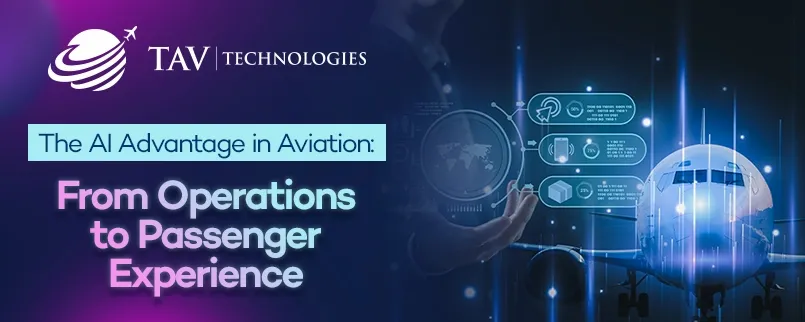
Dec 2024
AI is the hot topic in the world lately which is transforming industries worldwide and aviation sector is no exception. At TAV Technologies, we’re leveraging intelligent technologies to make airports, airlines, and ground services more efficient, smarter, and passenger-friendly. In this article, we’ll take a closer look at how these innovations are improving aviation operations and transforming the passenger experience.
Smarter Passenger Flow Management with AI
Managing passenger flow in airports can be challenging, especially during peak travel times. Long queues and congestion can lead to frustration. With advanced systems, these issues can be mitigated, ensuring smoother airport operations. Intelligent systems analyze data from key airport points—such as check-in counters, security gates, and flight schedules—to predict congestion and adjust staffing accordingly. Additionally, these systems help monitor passenger queues in real-time, deploying additional resources or opening new lanes to prevent delays and streamline the experience.
AI-Powered Personalized Passenger Assistance
At TAV Technologies, we believe that providing personalized, timely information to passengers is key to enhancing their travel experience. Our solutions offer passengers tailored support, helping them navigate airports with ease. Virtual assistants integrated into kiosks and mobile apps provide real-time flight information, gate changes, and directions in multiple languages, ensuring international travelers receive the support they need. These systems go beyond basic information, offering updates specific to each traveler—whether it's a gate change, lounge access, or flight delay notifications.
Predictive Maintenance to Keep Operations Running Smoothly
Ensuring that airport infrastructure and equipment are always operational is crucial for smooth operations. Predictive maintenance helps monitor the health of airport infrastructure and prevents potential failures before they disrupt operations. Systems analyze the condition of critical systems like baggage handling, elevators, and HVAC (Heating, Ventilation, and Air Conditioning) systems, predicting when maintenance is needed. Moreover, maintenance is scheduled at optimal times to prevent unscheduled disruptions, ensuring smooth and uninterrupted operations.
Enhancing Security with AI-Driven Surveillance
Security is always a priority at airports, but it must also be efficient. Smart technologies are helping improve the effectiveness and speed of airport security operations, allowing for faster identification and response to potential threats. Video analysis identifies suspicious activities, such as unattended baggage or unauthorized access, improving security without slowing down operations. Additionally, facial recognition technology helps speed up identity verification, reducing wait times at check-in and security points.
Optimizing Flight Operations and Resource Allocation with AI
Efficient flight operations are key to reducing delays and improving passenger satisfaction. TAV Technologies uses intelligent systems to automate key tasks in flight operations, such as gate assignments, baggage handling, and ground services. These systems help automatically assign gates based on factors like aircraft size, time of arrival, and available resources, minimizing delays. They also streamline ground services such as fueling, baggage handling, and aircraft servicing, reducing turnaround times and ensuring flights depart on schedule.
AI in Marketing: Enhancing Passenger Engagement
Intelligent technologies are transforming not just operations but also the way airports engage with passengers. With these systems, marketing campaigns become more personalized, creating a more meaningful connection with passengers. The technology enables the creation of tailored promotions based on passenger profiles. For instance, special promotions might be offered to premium passengers, such as lounge access or exclusive offers. Furthermore, systems support the creation of marketing content in multiple languages, making it easier for airports to connect with international travelers and enhance the inclusivity of their campaigns.
Data Analytics and Decision Support with AI
In an increasingly data-driven world, the ability to make fast, informed decisions is critical. Powered analytics provide airports with real-time insights, allowing them to adjust resources and improve operational efficiency. Dashboards aggregate data from various airport functions, giving managers the insights they need to optimize staffing, resource allocation, and service delivery. By forecasting future demand, these systems help airports plan ahead, ensuring that resources are in place to handle peak periods without delays.
The Future of AI-Driven Aviation
AI is not just a buzzword; it's a transformative force reshaping the aviation industry. TAV Technologies is leading this change by developing AI solutions that improve operational efficiency, enhance security, and deliver a better experience for passengers. As AI technology continues to evolve, its potential to shape the future of air travel is boundless. By embracing AI, airports and airlines can stay ahead of the curve, offering a seamless, secure, and personalized travel experienc
